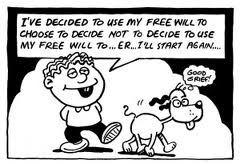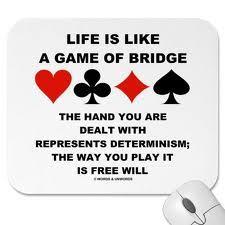I recently had an article in The Humanist magazine, entitled “Is Freedom a Mistaken Idea?” Click here to read the whole thing; below is a condensed version (but with jazzier illustrations):
Freedom means doing what you want. But is that really important? Or even meaningful?
Some might say that individuals doing what they want isn’t even good; that we exist chiefly as social creatures, and the group comes first. Such ideas characterize some Eastern cultures, notably Japan’s; in stronger form this is the essence of ideologies like fascism and communism, where individuals exist to serve the collective.

Yet a deeper question is whether we can truly be free, in any genuine sense. Arthur Schopenhauer said you can do what you want, but cannot will what you want. That is, you can fulfill desires and wishes, but can’t choose what desires and wishes to have.
This is the ancient problem of free will. A recent Humanist article suggests that punishing Anders Breivik for mass murder may be as immoral as his crimes themselves, because the shootings were caused by brain events over which “Breivik” had no control. I put “Breivik” in quotes because, on this analysis, the person virtually disappears. Does this make sense?

Moreover, science has shown (as discussed in books like Daniel Gilbert’s Stumbling on Happiness and Dan Ariely’s Predictably Irrational) that not only don’t we choose our wants and desires, but often we don’t even know what they are. We can misjudge what we think we want; and how fulfillment will actually affect us. (As George Bernard Shaw said, there are two big disappointments in life: not getting what you want, and getting it.) This leads some to consider the assumption of “rational choice,” supposedly underlying free market economics, a myth.
But let’s go back to the most fundamental question: What matters? Why does it matter? And to whom?

This idea is easily mocked. There is a suspicion that humans aren’t important or worthy, and fixating on our feelings is narcissistic and trivial. And you can loftily argue that something can be good or bad in some objective sense, irrespective of human feelings. But what is the point of considering something “good” if it doesn’t somehow contribute to sentient beings feeling good? Remove that from the picture, and what is there to care about?
I will not purport here to fully resolve the problem of free will. True enough, thinking and decision making are deterministically governed. However, what’s unique about humans is that we think about our thinking. This gives us an override capability—exerting what might legitimately be termed “will.” (Legal scholar Jeffrey Rosen has called this “free won’t.”) Sigmund Freud too, who considered us creatures of

So returning to Breivik, his brain did produce violent impulses he couldn’t control. But, as psychologist Thomas Szasz has argued, so do all our brains; yet to act upon those impulses crosses a behavioral line that almost everyone is able to control. Hence it’s not immoral to punish the behavior. It is no mere illusion to feel we have that kind of free will.

This is true even if those desires arise deterministically, and even if people pursue them with imperfect rationality. That’s still better than not choosing at all. In fact, despite all the imperfections, we nevertheless act, in our day-to-day continuous decision making, with a very high degree of rationality. The

